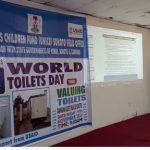Only about half of Nigeria’s population has access to basic sanitation services and a quarter of this number practice open defecation with dire consequences to public health, and the environment.
Experts at the opening event of the national workshop on safely managed sanitation say progress on achieving the SDG sanitation target is off track and the country remains among those left behind.
Access to safely managed sanitation is a fundamental human right but millions of people across the globe lack this access.
In Nigeria, only 18 percent of the population has access to safely managed services leaving more than 46 percent without access to basic sanitation.
This gathering of experts in the water and sanitation sector are meeting to bring up discussions on the right steps to improve sustainable sanitation for all citizens through innovation, policy frameworks, community engagement and behavioural change.
The sustainable development goal target 6.2 for sanitation seeks that by 2030 there should be an improvement in access to adequate and equitable sanitation and hygiene for all and end open defecation, paying special attention to the needs of women and girls and those in vulnerable situations”.
But with just six years to this target Nigeria still remains far behind.
According to a 2012 report by the world bank, Nigeria loses an estimated 455billion naira annually due to the use of unsanitary toilets and open defecation.














